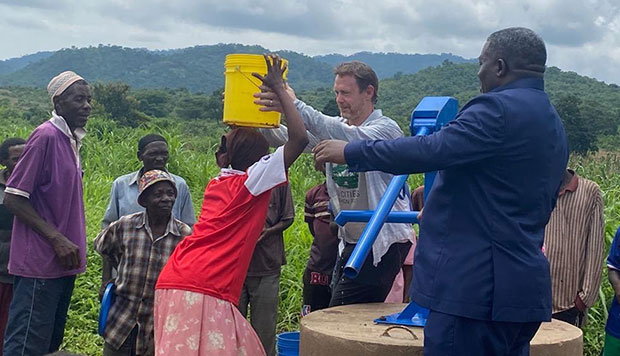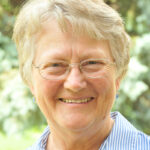
Mike Stein, center, participates in a well dedication ceremony in Tanzania earlier this year.
By Lindsay Steele
The Catholic Messenger
Mike Stein regularly infuses his running hobby with the desire to bring safe water access to communities in need. Stein raised about $17,000 for the Sister Water Project last year while preparing to run the Quad Cities Marathon.
In January, the pharmacist from St. Thomas More Parish in Coralville took his dedication a step farther, flying more than 8,000 miles to Tanzania to see some of Sister Water Project’s wells in action. By immersing himself in the communities, he better understands the need and sees the impact clean water can make. “It was powerful and moving,” he said.
The Sisters of St. Francis in Dubuque, Iowa, founded the Sister Water Project in 2006 to bring safe water to villages in Tanzania and Honduras. Stein’s late aunt, Sister Annette George, was a member of the congregation. Stein was among a group of 10 laypeople and religious sisters who traveled to Tanzania under the direction of longtime supporter Brian Gilligan. Checking on previously installed wells to ensure they are still delivering water properly, regardless of precipitation, was the group’s primary objective.
During the trip, Stein learned that about 60% of government-installed wells are unreliable or no longer work. “They don’t dig the wells deep enough and in the dry season there is no water,” he explained. Currently, all 407 Sister Water Project wells in Tanzania are in operation, thanks in part to community ownership and quality control, he said. Communities put money down for maintenance before local partners dig the wells. The pumps used to extract the water are manual, so utility access is not required.
Throughout the trip, communities expressed gratitude for the blessing of clean water access. Women and girls save time fetching water, providing more time for school or making extra income for their families, Stein said, adding that sickness levels in the community are reduced.
He was pleased to learn that communities with Sister Water Project-funded wells do not “gatekeep” water access. “Nobody pays to use it, even if they’re from nearby communities. Anyone who needs water can use the well.” Communities with wells regularly encourage other communities to reach out to Sister Water Project so they can experience the full benefits of local, clean water access.
Stein witnessed the ribbon cuttings of four wells – three of which were funded through his running campaigns. There was “a lot of singing and dancing,” he said. “I was thankful to the villages and communities for the opportunity to participate and celebrate with them.”
Stein won’t be running any marathons this year due to a lingering hip injury but is hoping to do shorter races in 2025 and get other runners involved. He’s also contemplating a trip to Honduras to help audit the Sister Water Project wells there. Water “is such a simple thing, but it’s so life changing,” he said.











